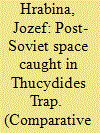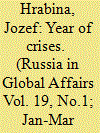| Srl | Item |
| 1 |
ID:
193535


|
|
|
|
|
| Summary/Abstract |
Witnessing the pro-Western shifts in the post-Soviet countries, Russia has failed to develop policies that would attract the former Soviet satellites without keeping them in its sphere of influence via hard-power. On the other hand, Western values, political influence and institutions have penetrated Eurasian countries causing Russia’s relative decline. This structural dynamic not only entraps Russia in a zero-sum game with the West but also triggers Russian threat perceptions on the unit level. Russian strategic culture emphasizes anxieties about loss of sovereignty or power shifts in the Russian regime that could mean the end of the current establishment, border security, and great power status resurrection. A combination of these threat perceptions and structural shifts manifests in the Thucydides Trap, an ancient dilemma behind the preventive war, in the post-Soviet space.
|
|
|
|
|
|
|
|
|
|
|
|
|
|
|
|
| 2 |
ID:
178811


|
|
|
|
|
| Summary/Abstract |
The decline of the U.S.-led liberal world order revealed the changes
in the international system several years before the recent crises. The
central argument in this article is that the COVID-19 humanitarian crisis,
the crisis of the political elite in the West and the looming economic
crisis have reinforced the structural shifts attributing to the decline of
Pax Americana and further diffusion of power. This paper discusses the
impact of the 2020 crises on the structure of international relations
and aims to illuminate the relationship between the structural shifts
and current struggle among the great powers. Today the international
system succumbs to more disorder and entropy, while the U.S. tries to
balance out China’s growth and contain militarily strong Russia. In their
turn, Russia and China seek to dismantle the U.S.-led international order.
Hence, since the current international system bears both nonpolarity and
multipolarity features, it seems reasonable to compare the two concepts in order to identify contemporary shifts in the theoretical framework.
This paper offers a unit-level analysis of the internal crises in the United
States, China, Russia, the European Union, and Germany, and evaluates
their international capabilities using a comparative analysis as the primary
method. At the same time, the paradigmatic debate in this paper is mostly
represented by the Realist school of political thought.
|
|
|
|
|
|
|
|
|
|
|
|
|
|
|
|